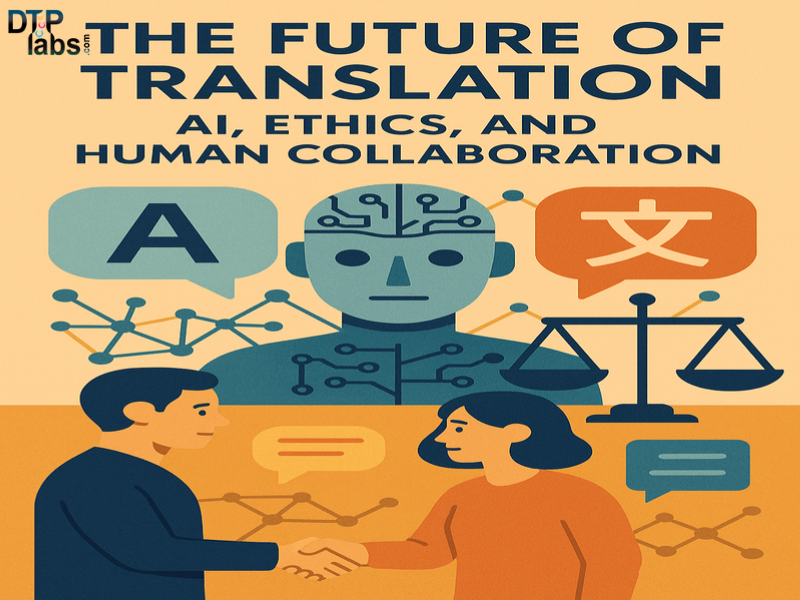Introduction
Artificial intelligence (AI), through the use of machine learning and natural language processing, has profoundly transformed translation and interpretation. Tools like Google Translate and DeepL provide fast translations, improving accessibility and supporting cross-cultural communication. However, issues with accuracy, contextual understanding, and cultural sensitivity still pose significant challenges, sometimes resulting in misinterpretations. Improving translation quality and reducing biases requires a cooperative strategy that combines AI and human skills. This chapter critically examines the dynamic between human translators and AI, focusing on collaborative approaches, ethical implications, and strategies for fostering effective future partnerships.
How AI is Changing the Translation Industry
AI will ultimately increase the translation services sector’s productivity. No matter the sector, businesses will no longer need to account for the time required to source experienced translators when planning timelines. Projects can start more quickly as a result, and meeting deadlines and milestones is made simpler.
Big data mining benefits
AI enables translation software to rapidly access and process large datasets of relevant information. Google Translate is particularly effective at this. Only about twice as many words are translated annually by human translators.
We’re still a long way from achieving flawless machine translations, as AI is not yet perfect. However, translation technology is advancing rapidly. From regular users to small and medium-sized enterprises that might not be able to pay for traditional translation services, it is undoubtedly making serviceable translations available to everyone.
Why Human Translators Are Still Essential
Professional human translators with extensive language translation training are used in human translation. They will comprehend the subtleties of the original material because they are frequently native speakers. For thousands of years, professional translation services employing qualified linguists have been in use. The expertise and commitment of human translators may guarantee excellent outcomes.
Here are some key reasons why human translators are still crucial:
Accuracy:- Because machine translation software is only as good as the data it can store, humans are still more sophisticated than machines. Because human translators are able to interpret and communicate meaning while also considering the intended audience, their translations are more accurate.
Confidentiality and Security:- The capacity to preserve security and confidentiality is another benefit of using human translation. Human professionals are bound by ethical rules, which can be relied upon to protect sensitive information.
The Human Element: It’s crucial to acknowledge the important role that human involvement plays in translation. Understanding the author’s objectives, feelings, and cultural background is equally as important as simply translating words from one language to another when translating a work. Machines cannot match the complexity and compassion that human translators bring to their work.
Ethical Concerns in AI Translation
Bias:- With the creation of machine translation (MT) technologies, artificial intelligence (AI) has completely transformed the translation sector. Although these technologies have increased translation accuracy and speed, biases still affect them. The systematic and unfair modification of data that produces unfair or inaccurate findings is known as bias in AI.
Data Bias: This happens when the training data used to create AI models is inaccurate, lacking in representativeness, or inadequate.
Privacy Concerns
Large volumes of data, including sensitive and private information, must frequently be gathered and processed in order to use AI-powered translation systems. Data security and privacy are called into question by this.
The Future: Human-AI Collaboration in Translation
The future of translation will be influenced by the cooperation between AI and human translators. Human translators continue to play a crucial role in creating excellent, contextually accurate translations, even as AI technology transforms the translation sector. At XL8, we believe that collaboration between humans and AI could transform localization and allow for infinite communication between businesses and people. Language obstacles can be crossed more successfully than ever before thanks to the combination of AI’s efficiency and human skill, which makes international communication more accessible and inclusive.
The future of human-AI collaboration holds immense potential. As AI advances, it will enhance human abilities in creativity, problem-solving, and emotional intelligence. Innovations like wearable AI and augmented reality (AR) will deepen AI’s integration into daily tasks, boosting decision-making and productivity across various industries.
Conclusion
AI is transforming the industry by making translation faster and more accessible, but it cannot replace the cultural insight, emotional intelligence, and creative judgment of human translators. Ethical considerations must guide how we implement and use AI to ensure fairness, privacy, and accountability.
As we move forward, the most successful translation strategies will combine the speed and scale of AI with the nuance and depth of human expertise. This collaboration will not only improve translation quality but also open new possibilities for cross-cultural communication in an increasingly connected world.
DTP Labs is a desktop publishing company based in New Delhi, India. We offer book publishing Services, PDF to Word conversions, post-translation DTP, and e-learning localization services to translation agencies worldwide. To avail of our services, check out our website www.dtplabs.com or contact us at info@dtplabs.com.

